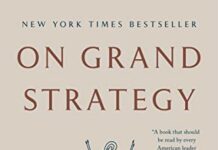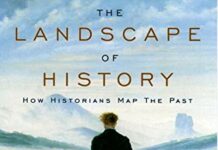
Ebook Info
- Published: 1998
- Number of pages: 448 pages
- Format: PDF
- File Size: 2.45 MB
- Authors: John Lewis Gaddis
Description
Did the Soviet Union want world revolution? Why did the USSR send missiles to Cuba? What made the Cold War last as long as it did? The end of the Cold War makes it possible, for the first time, to begin writing its history from a truly international perspective. Based on the latest findings of Cold War historians and extensive research in American archives as well as the recently opened archives in Eastern Europe, the former Soviet Union, and China, We Now Know provides a vividly written, eye-opening account of the Cold War during the years from the end of World War II to its most dangerous moment, the Cuban missile crisis. We Now Know stands as a powerful vindication of US policy throughout the period, and as a thought-provoking reassessment of the Cold War by one of its most distinguished historians.
User’s Reviews
Editorial Reviews: Review “A lively, deeply informed summary, the most accessible and compelling guide to the international conflicts, issues, and dominant ideologies of the early Cold War era.”–Kirkus”A magisterial overview that clarifies all issues of the cold war’s origins.”–Booklist About the Author John Lewis Gaddis is Robert Lovett Professor of History at Yale University. His many books include Strategies of Containment, The Long Peace, and The United States and the End of the Cold War.
Reviews from Amazon users which were colected at the time this book was published on the website:
⭐Having grown up during the Cold War, I have always been interested in what was actually going on. It is not that we were only lied to during the Cold War. That would be a misrepresentation of the reality of those times. Rather, there were many voices proclaiming different realities to be true. There were the far right John Birchers, there was the far left Communist Party of America and the organs of the Soviet Union (Tass and Pravda) and everything in between.What is now called the “mainstream press” was really all there was back in those days (the organs of the extreme organizations were decidedly small circulation underground voices) and these big voices moved more left as the years passed by beginning with the Alger Hiss case. It was not until the Soviet archives were opened and the Venona documents were declassified that incontrovertible evidence forced the left to admit that Hiss was indeed working for the Soviets.This book begins with the end of World War Two through the Cuban Missle Crisis. It provides fascinating insight into what the Soviet Archives actually confirm about those decades. We now know that the Soviets had clear designs on Europe and thought they had Germany in their pocket. Except for the Marshall Plan, they very well might have succeeded. We know that it took Stalin’s go ahead to start the Korean War, and we know much more about the Soviet thinking leading up to and during the Cuban Missile Crisis.Prof. Gaddis provides a fascinating story and solid reporting and incisive analysis. I enjoyed this book a great deal. Some may wonder why it is so important to clarify these past events. It is simply because so many voices were wrong and many of them were consciously trying to obfuscate the truth or were being used by those supporting the interests of the Soviet Union. They did so for many different reasons. Nevertheless, they were working against the interests of the United States (of course, some of them then and today say that their actions are, in fact, working for the interests of the United States because they see their socialist (or progressive) vision as in the interests of the USA).Some may find the facts reported in this great book to be difficult to accept because of the conflict with their ideology. I do feel sorry for them. Prof. Gaddis does a solid job in presenting reality in a way that is hard to gainsay. It is very hard to spin away from the conclusions presented in this important book.
⭐Usually, books with “New” or “Rethinking” set off my alarm bells. It is usually always revisionism lauding socialists. You can try this as you go through your day: in any newspaper article, magazine headline, report on social science, or school board policy, replace the word “new” with the word “socialism;” it usually works out.This book was a pleasant surprise, examining the early history of the cold war and bringing in recent research. The author can be didactic and repetitive, but there are only so many ways to describe the events after WWII between the Soviets and the west.The cold war was inevitable, given Stalin as the Soviet leader. Addis defends this argument through the course of the book.Entertaining to read: well written, and just about as often cheery as bombastic.
⭐The book I ordered from Teacher Bookstore was for the fall semester of my sophomore year.I have to say that this is the first time that I receive a package from Amazon and it felt as if it was a Christmas gift.Teacher Bookstore hand wrote little messages that made you feel like if you’re really appreciated.I opened the package and it was neatly wrapped and tapped in newspaper, and below that it was neatly wrapped up in bubble wrap!I don’t know about you guys, but to me this made me feel as if they really cared that I received my book 100%, without any folds, tears, or damages.Highly recommend Teacher Bookstore.SP1702P.S. – there was even a message on my receipt (hand written), “Thank you for you purchase. Enjoy your book. – Teacher Bookstore.” Honestly, I think no one now days even cares about writing a note or making sure they make their customers feel appreciated.
⭐it is written in a clear, logical style. In the first few pages Mr. Gaddis demolishes arguments suggesting that “if only WE had been a little more accommodating” maybe there would have been less of a cold war. I am in the midst of it so can’t yet do it justice. Interestingly, this book was written before the Annals of Communism series published by Yale University Press were commenced, Much was published in those volumes which was not available to Mr. Gaddis when he wrote his book.
⭐The only complaint I have is that the book basically ends around the Cuban Missile Crises. Besides that it provides excellent insight into the Cold War. If I had to recommended a book on the Cold War it would be this one. I’d also recommend Diplomacy by Henry Kissinger, its not entirely the Cold War but it has some great insights and Kissinger provides amazing personal detail into the subject. Both are just great books all around. Definitely read them.
⭐John Lewis Gaddis has long been known as one of the most knowledgeable analysts of US foreign relations. What makes this book so valuable is that during Yeltsin’s term of office, the Soviet archives were opened to scholars. Whereas earlier scholars had very little hard data to analyze who in the Soviet Union were making decisions and for what purpose, now we know. And it is this new documented knowledge which has transformed our understanding of Soviet foreign relations.A book published in Europe by former Communists and leftists, expert in each of the countries under Communist domination is a good companion book. These experts document the brutality Communist regimes have used to gain and keep power.
⭐A now dated but still brilliant study of new developments in Cold War history (as of 1997). By one of the masters of the field.
⭐There are so many good reviews here. Why is this book important? For a younger generation that did not live through The Cold War, this book gets it straight. Not the revisionist history that is constantly fobbed off on us on a daily basis and in far too many of our institutions of higher learning. I strongly recommend this book as THE BEST on The Cold War.
⭐Not bad but very post post revisionist history
⭐Good to review the perspectives of this book from 1997
⭐Very interesting book, it opens your eyes to the cold war
⭐perfect conditions, no pages highlighted, as the description was drawing. it Arriveded before the time expected. overall a positive feedback
⭐Fantastically detailed. A must for any politics or modern history student
Keywords
Free Download We Now Know: Rethinking Cold War History (Council on Foreign Relations Book) in PDF format
We Now Know: Rethinking Cold War History (Council on Foreign Relations Book) PDF Free Download
Download We Now Know: Rethinking Cold War History (Council on Foreign Relations Book) 1998 PDF Free
We Now Know: Rethinking Cold War History (Council on Foreign Relations Book) 1998 PDF Free Download
Download We Now Know: Rethinking Cold War History (Council on Foreign Relations Book) PDF
Free Download Ebook We Now Know: Rethinking Cold War History (Council on Foreign Relations Book)


